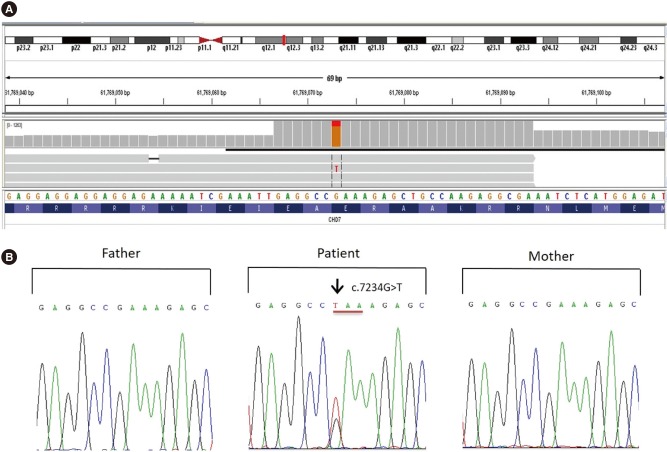Ann Lab Med.
2019 Sep;39(5):503-506. 10.3343/alm.2019.39.5.503.
Identification of a Novel CHD7 Mutation in a CHARGE Syndrome Patient in Indonesia
- Affiliations
-
- 1Department of Medical Biology, Division of Human Genetics, Faculty of Medicine, Swadaya Gunung Jati University, Cirebon, Indonesia. garabrajadenta@gmail.com
- 2EA3808 Neurovascular Unit and Cognitive Impairments, University of Poitiers, Poitiers, France.
- 3Center for Biomedical Research (CEBIOR), Faculty of Medicine, Diponegoro University, Semarang, Indonesia.
- 4Department of Pediatrics, Faculty of Medicine, Diponegoro University/Diponegoro National Hospital, Semarang, Indonesia.
- 5Department of Genetics, Poitiers University Hospital, Poitiers, France.
- KMID: 2450977
- DOI: http://doi.org/10.3343/alm.2019.39.5.503
Abstract
- No abstract available.
MeSH Terms
Figure
Reference
-
1. Issekutz KA, Graham JM, Prasad C, Smith IM, Blake KD. An epidemiological analysis of CHARGE syndrome: preliminary results from a Canadian study. Am J Med Genet A. 2005; 133A:309–317. PMID: 15637722.2. Hale CL, Niederriter AN, Green GE, Martin DM. Atypical phenotypes associated with pathogenic CHD7 variants and a proposal for broadening CHARGE syndrome clinical diagnostic criteria. Am J Med Genet Part A. 2016; 170A:344–354. PMID: 26590800.3. Vissers LE, van Ravenswaaij CM, Admiraal R, Hurst JA, de Vries BB, Janssen IM, et al. Mutations in a new member of the chromodomain gene family cause CHARGE syndrome. Nat Genet. 2004; 36:955–957. PMID: 15300250.4. Legendre M, Abadie V, Attié-Bitach T, Philip N, Busa T, Bonneau D, et al. Phenotype and genotype analysis of a French cohort of 119 patients with CHARGE syndrome. Am J Med Genet. 2017; 175:417–430. PMID: 29178447.5. Pramudita J, Utari A, Winarni T, Faradz S. CHARGE syndrome: an Indonesian case report. J Biomed Transl Res. 2017; 1:23–25.6. Tischfield MA, Bosley TM, Salih MAM, Alorainy IA, Sener EC, Nester MJ, et al. Homozygous HOXA1 mutations disrupt human brainstem, inner ear, cardiovascular and cognitive development. Nature Genet. 2005; 37:1035–1037. PMID: 16155570.7. Richards S, Aziz N, Bale S, Bick D, Das S, Gastier-Foster J, et al. Standards and guidelines for the interpretation of sequence variants: a joint consensus recommendation of the American College of Medical Genetics and Genomics and the Association for Molecular Pathology. Genet Med. 2015; 17:405–424. PMID: 25741868.8. Lalani SR, Hefner MA, Belmont JW, Davenport SLH. CHARGE syndrome. Updated on Feb 2012. http://www.ncbi.nlm.nih.gov/books/NBK1117/.9. Frank M, Prenzler A, Eils R, Graf von der Schulenburg JM. Genome sequencing: a systematic review of health economic evidence. Health Econ Rev. 2013; 3:29. PMID: 24330507.10. Grozeva D, Carss K, Spasic-Boskovic O, Tejada MI, Gecz J, Shaw M, et al. Targeted next-generation sequencing analysis of 1,000 individuals with intellectual disability. Hum Mutat. 2015; 36:1197–1204. PMID: 26350204.
- Full Text Links
- Actions
-
Cited
- CITED
-
- Close
- Share
- Similar articles
-
- Identification of a novel mutation in the CHD7 gene in a patient with CHARGE syndrome
- Hypogonadotropic Hypogonadism and Abnormal Olfactory Bulb Development in CHARGE Syndrome with CHD7 Mutation
- A case of CHARGE syndrome featuring immunodeficiency and hypocalcemia
- Non-Homologous End Joining Repair Mechanism-Mediated Deletion of CHD7 Gene in a Patient with Typical CHARGE Syndrome
- Successful intubation using video laryngoscope in a child with CHARGE syndrome: A case report


